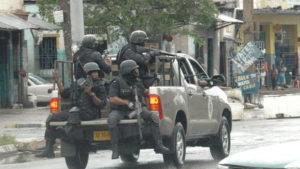
Security forces will have the power to search, curtail operating hours of business, restrict access to places, detain people without a warrant, stop and question persons, seize property, and control public gatherings and movements until May 2.
The State of Public Emergency declared in Jamaica in the parish of St James, where the island’s tourist capital Montego Bay is located, will stay in place for another three months.
The House of Representatives yesterday approved a resolution extending the provision – which took effect on January 18 for an initial period of 14 days – until May 2. All 51 members of the House who were present voted in favour of the motion. Eleven members were absent.
In an address prior to the passage of the resolution, Prime Minister Andrew Holness explained that the extension was necessary, as more time is required for the security forces to carry out operations in the parish where 335 people were murdered last year.
“It was not anticipated that all that is required would be accomplished in 14 days. It is reasonable to expect that even with extraordinary powers, it will take some time to affect the situation in St. James,” he said.
Holness added that the rampant criminality, in particular murder, lottery scamming, trafficking and other illicit businesses, is evidence of an ecosystem of crime that is well resourced and interconnected, with broad reach in the parish of St James through a network of facilitators, both public officials and private persons.
“The intelligence picture is being built on not only perpetrators, but also on the facilitators as well, and we will be targeting both the street-level criminal and the facilitators,” he assured.
Adding that confidence is being built between the public and the security forces, the Prime Minister said: “We need to support the security forces within the context that they will enforce the law within the provisions as we ensure a better future for our citizens. While we acknowledge that there will be some disruption and fallout, we must take back control of our country and we must dismantle the network of organized crime.”
Holness stressed that the declaration of a State of Public Emergency does not mean the suspension of the rule of law, adding that the security forces are expected to and have been directed to treat citizens with respect and to protect the dignity and safety of all.
During the State of Public Emergency, the security forces have the power to search, curtail operating hours of business, restrict access to places and detain persons without a warrant. It also gives them power to stop and question persons and power to seize property. They can also control public gatherings and control movements.
Holness said the additional powers allow the security forces, through a suite of operations, to bring the high levels of violence and murders under control and also prevent the movement of weapons.
“The overall government response to the criminal ecosystem has to be more sophisticated than solely direct action on criminal gangs. It must be extended beyond the JCF and the JDF to other enforcement arms of the Government whose efforts address unexplained wealth, public order in the towns, illegal construction, illicit businesses, and many other matters that affect the rule of law,” he said.
Since the State of Public Emergency was announced, 10 guns have been retrieved, and 51 people have been arrested and charged.
Leader of the Opposition, Dr. Peter Phillips, said his side supported the extension of the State of Emergency.
“We accept that the peace could not be restored sufficiently in the 14 days permitted under the Constitution and that more time needs to be made available to the security forces in order for confidence in the state of civil order to be spread widely among the people of St. James,” he said.
However, he cautioned against using this method of tackling crime in an “open-ended” manner.
“Even as we are minded to support the extension for three months, there cannot be an open-ended state of emergency in St James or any other part of the country, so while we will support this, we urge that all necessary measures will be taken to ensure that the situation is brought under control,” he said.
He called for the “kingfish of organized crime in St James to be brought to book”.
